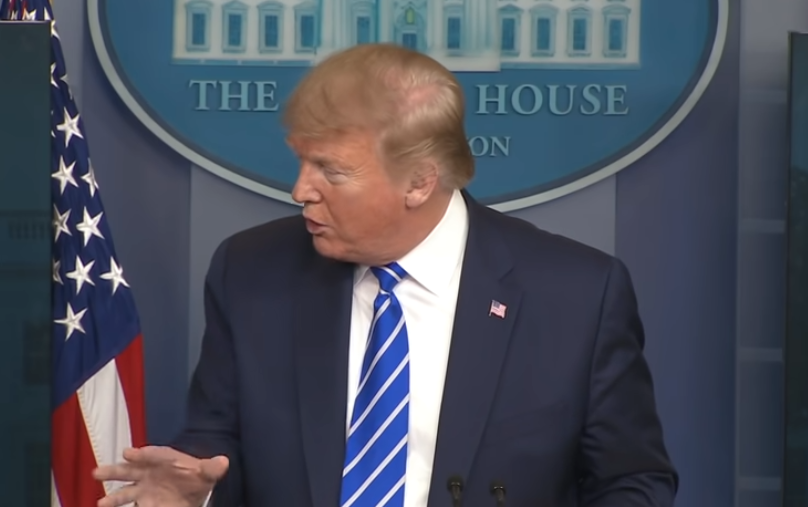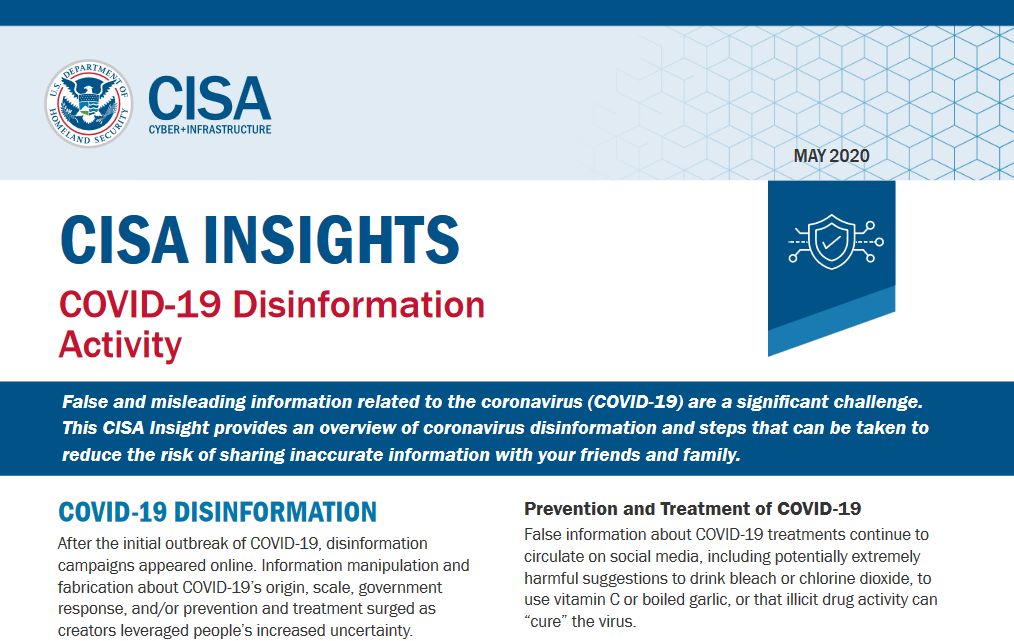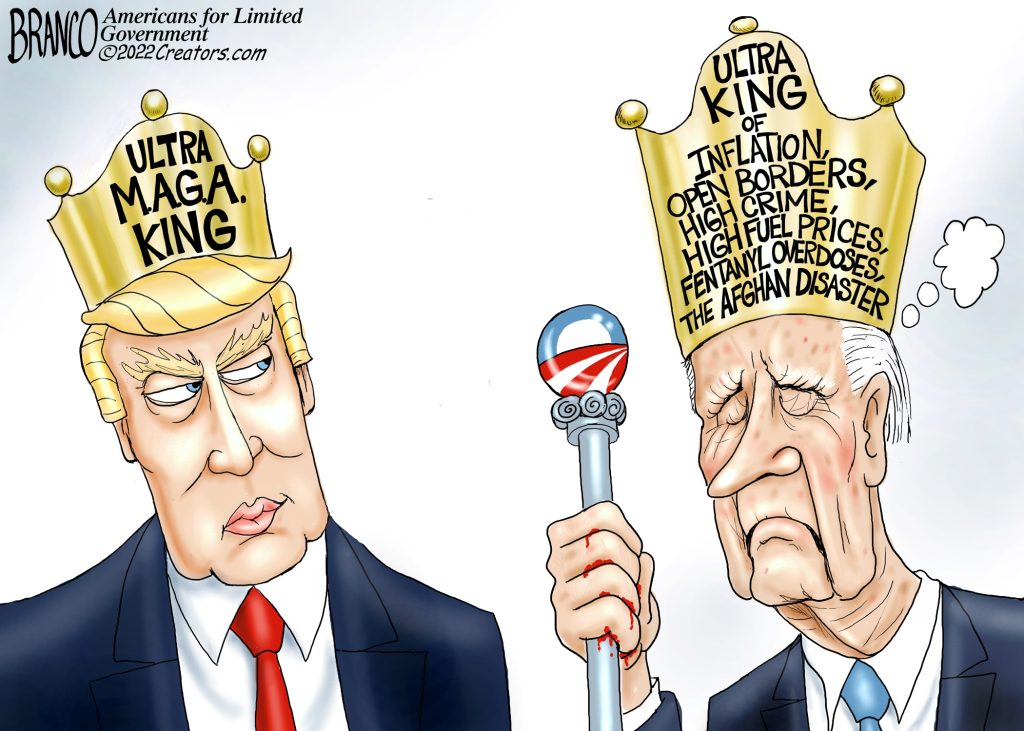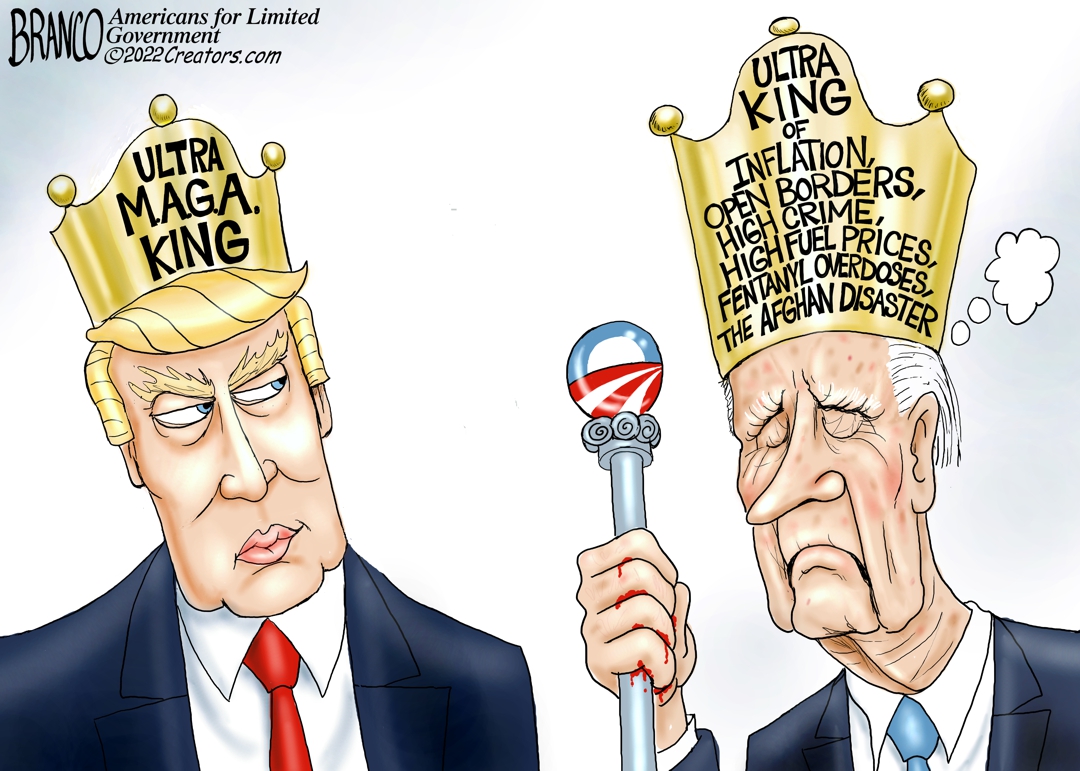May 17, 2022
Permission to republish original opeds and cartoons granted.
DHS’ disinformation agency warned against ‘harmful suggestions to drink bleach’ to kill Covid after Trump press conference in 2020

By David Potter
The Department of Homeland Security’s disinformation agency, the Cybersecurity and Infrastructure Security Agency (CISA), in early May 2020 issued a disinformation warning against “potentially extremely harmful suggestions to drink bleach” after a controversial April 23, 2020 press conference by former President Donald Trump about the use of solar light and other disinfectants to kill Covid on surfaces.
The President turned to members of his coronavirus taskforce and asked them if solar light could be investigated as a possible treatment for the virus. Trump said, “supposing we hit the body with a tremendous — whether it’s ultraviolet or just very powerful light — and I think you said that that hasn’t been checked, but you’re going to test it. And then I said, supposing you brought the light inside the body, which you can do either through the skin or in some other way, and I think you said you’re going to test that too. It sounds interesting…”
Trump compared the use of sunlight to “the disinfectant, where it knocks it out in a minute,” asking, “is there a way we can do something like that, by injection inside or almost a cleaning?” and concluding, “But the whole concept of the light, the way it kills it in one minute, that’s — that’s pretty powerful.”
President Trump did not assert that such treatments were proven effective. Nor did he recommend that Americans ingest or inject disinfectants. Right or wrong, he wondered aloud if sunlight could somehow be used the treat the virus.
For most reasonable individuals, a key indicator that President Trump was asking questions to administration officials, rather than prescribing at-home cures for Americans, was that he held near constant eye contact with his coronavirus taskforce member while speaking. His vocal inflection was that of a person posing questions. Lastly, for most reasonable individuals, his choice of language was clearly indicative of a line of questioning. “And is there a way we can do something like that” and “you’re going to have to use medical doctors with” referred to his team acting with doctors to investigate.
To be fair, it did not look good for Trump when, being questioned about his questions the next day, he declared them as sarcasm. Nonetheless, his interactions are on camera for everyone to see and it is clear that he was asking questions, not professing decrees. Even PolitiFact (a left-wing fact-checking organization) author Daniel Funke, stated that “Trump did not say people should inject themselves with bleach or alcohol to treat the coronavirus”.
While some outlets were careful to be precise in stating that Trump was musing the treatment possibilities with his coronavirus taskforce, many were careless, factually incorrect, and promoting disinformation. PolitiFact declared that “several websites and social media posts have taken them out of context.” Some of those were factcheck.org, Politico, Washington Post, NBC News, ABC News, New York Times, and CNN, which respectively inaccurately reported that President Trump was “dangerously suggesting at a White House briefing that ingesting disinfectant could possibly be used to treat people who have the virus.”
Funke noted, “Trump’s remarks caused some companies and state agencies to issue warnings about ingesting disinfectants.”
Specifically, about two weeks after Trump’s press conference, CISA created a guideline that targeted the very language that President Trump used in late April of 2020 to pose questions, warning that “false information about COVID-19 treatments continue to circulate on social media, including potentially extremely harmful suggestions to drink bleach or chlorine dioxide, to use vitamin C or boiled garlic, or that illicit drug activity can ‘cure’ the virus.”

Unfortunately, the corporate media used Trump’s comments to construct a fake narrative so that they themselves “debunk” this narrative, generating publicity, profit, and to stoke negative sentiments towards President Trump in an election year. This isn’t a new phenomenon.
What was novel, however, was a United States government agency entering a political debate and arbitrating what is truth and what is falsehood.
When questioned about this, former White House Press Secretary Jen Psaki went on the defense and stated “but I think what’s important to note here is what the board is doing, which is continuing what is important disinformation-related work that began under the former administration.” That’s true. CISA, the Cybersecurity and Infrastructure Security Agency, which was founded on November 16, 2018, during President Trump’s term in office, and operates within the Department of Homeland Security.
What Psaki failed to mention was that MDM did not exist under the Trump administration. The Countering Foreign Influence Task Force (CFITF) existed under the Trump administration. CFITF was altered by the Biden administration in 2021 and officially changed its name to the Mis-, Dis-, and Malinformation (MDM) team.
Unfortunately, Congress authorized the creation of CISA, and its disinformation activities, unanimously on November 13, 2018, authorizing CISA to “disseminate, as appropriate, information analyzed by the Department within the Department, to other agencies of the Federal Government with responsibilities relating to homeland security, and to agencies of State and local governments and private sector entities with such responsibilities in order to assist in the deterrence, prevention, preemption of, or response to, terrorist attacks against the United States.”
As it’s written and described in law, the reason for CISA is noble-sounding: preventing terrorist attacks against the United States. In CISA’s execution of its duties, however, priorities appear to have taken a dangerous partisan turn.
When some Americans innocently questioned the integrity of the 2020 Presidential election on social media, without harm, threat, or aggression, the Agency issued warnings against them, flagging them as disinformation to private social media companies. Covid “disinformation” such as anti-Covid vaccine activism, or even the President’s innocent question about using sunlight to fight the virus, was similarly elevated by the agency.
The implication is that these types of activism or inquiries pose a potential threat to homeland security or terrorism. But it is nothing less than a non-partisan agency acting in a partisan manner against political actors. In this case, it was to embarrass the President.
The activities of Biden and CISA’s disinformation governance is a salient example of how quickly liberty can erode when truth is entrusted in the hands of government bureaucrats instead of the marketplace of ideas. The government does not own truth. Give it back to the American people. Abolish MDM and limit the scope of CISA to prevent it from attacking Orwellian “thoughtcrimes”.
David Potter is a contributing editor at Americans for Limited Government.
Cartoon: Crowning Achievements
By A.F. Branco

Click here for a higher level resolution version.
To view online: https://dailytorch.com/2022/05/cartoon-crowning-achievments/

ALG Editor’s Note: In the following featured column from the Federalist’s Margot Cleveland, the criminal trial of former Perkins Coie lawyer Michael Sussman will prove the Hillary Clinton campaign and the Democratic National Committee financed and seeded the Russia collusion hoax with media outlets and the FBI in 2016:

Margot Cleveland: This week’s Spygate trial is bad news for Hillary Clinton
By Margot Cleveland
Subpoenaed Fusion GPS employee Laura Seago is likely to stay mum during questioning at the criminal trial of Michael Sussmann that starts this week. Her silence will be yet further evidence that the Hillary Clinton campaign financed and seeded the Russia collusion hoax to both the press and U.S. intelligence agencies.
Jury selection is scheduled to begin this morning in a D.C. federal court in the criminal case against former Clinton campaign attorney Michael Sussmann. While Sussmann faces a single charge of making a false statement to former FBI General Counsel James Baker, proof of that federal crime requires prosecutors to show Sussmann lied when he shared Alfa Bank data and whitepapers with Baker, telling the FBI lawyer that he was not acting on behalf of a client.
To prove that lie, Durham’s team, led by long-time prosecutor Andrew DeFilippis, will present evidence to the jury that Sussmann, in fact, was acting on behalf of two clients—the Clinton campaign and tech executive Rodney Joffe. The special counsel has already previewed much of the evidence it intends to present over the course of the expected two-week trial.
Prosecutors will first seek to establish that the Alfa-Bank hoax—a conspiracy theory that claimed Donald Trump had established a secret communications channel with the Russia-based Alfa Bank—originated with Sussmann’s client, Joffe, but was then shared with the Clinton campaign through its Perkins and Coie attorneys. The testimony of Georgia Tech researcher Dave Dagon, whom the special counsel gave immunity to last summer, will be key in this regard.
In the months leading up to the 2016 presidential election, Dagon worked closely with Joffe and the originator of the Alfa-Bank data, April Lorenzen, reviewing the data and a whitepaper supposedly showing the Russia-Trump connection. According to Durham’s indictment, Dagon also collaborated with Joffe and Lorenzen to craft another conspiracy theory related to the Russian-made Yota cell phones. In February 2017, Sussmann provided the CIA data related to the Yota cell phones, claiming that the Russian phones were typically used by top Russian officials and that the data showed the cellphones being in multiple locations near Trump, including in the executive office building of the president.
Dagon’s role, however, extended further, with him serving as the go-to expert to push the Alfa Bank story in the media. Emails reveal that the private investigative firm Fusion GPS, which Perkins and Coie hired on behalf of the Clinton campaign, pushed Dagon on reporters skeptical of the Alfa Bank story. Dagon’s testimony concerning his assistance to Fusion GPS in these efforts connects the Alfa-Bank hoax to the Clinton campaign because it was Perkins and Coie who hired Fusion GPS and not Joffe.
While Dagon holds some insight on Fusion GPS’s role in feeding the Alfa-Bank hoax to the media, prosecutors have also subpoenaed Fusion GPS’s “tech maven” Seago to testify. In response, Seago’s attorney, Holly Pierson, informed the government that Seago would invoke her Fifth Amendment privilege against self-incrimination absent a court order of immunity compelling her to testify at trial. Last month, on a motion by the special counsel, presiding judge Christopher Cooper entered an order immunizing Seago and compelling her to testify.
The court’s order, however, addressed solely Seago’s right not to incriminate herself, and did not address the question of attorney-client privilege. Another ruling last week by the D.C. federal judge addressed Joffe and the Clinton campaign’s claims of attorney-client privilege.
In that order, the court held that internal Fusion GPS emails related to “ordinary media-relations work” undertaken on behalf of the Clinton campaign were not protected by attorney-client privilege. Other emails, though, including eight emails with their attachments exchanged between Sussmann, Joffe, and Fusion GPS’s Seago, were protected by attorney-client privilege according to the court.
While the court’s order last week addressed only the few dozen emails at issue, the court noted it “will apply the principles set forth above to any assertions of privilege during witness testimony at trial.” Consequently, if prosecutors seek to inquire of Seago about communications she had with Joffe about the Alfa-Bank data and whitepapers, Seago is likely to respond that she cannot answer the questions based on attorney-client privilege.
Such a rejoinder, however, during the highly publicized Sussmann trial will force focus on the basis of that claim. And the premise underlying the court’s ruling that communications between Seago, Joffe, and Sussmann were protected by attorney-client privilege was that Joffe shared a “common interest” with the Clinton campaign.
Testimony by Seago that Fusion GPS worked with Joffe to push the Alfa-Bank conspiracy theory would further the special counsel’s goal of establishing that Sussmann represented Joffe and the Clinton campaign when he met with Baker; but her hiding behind attorney-client privilege would as well.
In fact, according to court filings the special counsel issued trial subpoenas to both the Clinton campaign and the Democratic National Committee “requesting the testimony of witnesses regarding the assertion of attorney-client privilege in front of the jury,” illustrating that Durham’s team sees value in the jury hearing from witnesses that the Clinton campaign sees itself as the client related to communications relevant to the Alfa Bank data.
Likewise, if Seago refuses to answer questions regarding conversations she had with Joffe and others regarding the Alfa Bank data, prosecutors can still win from that loss, with jurors learning from the assertion of privilege that the Alfa Bank theory arose from communications with Joffe, on behalf of the Clinton campaign.
The real loser, though, will be Hillary Clinton, who risks the spectacle of a court ruling during public proceedings that Seago’s communications with Joffe were protected by attorney-client privilege given Fusion GPS’s role of assisting the Clinton campaign. And that is but a sliver of the evidence likely to come out during Sussmann’s trial connecting Clinton to Spygate.
To view online: https://thefederalist.com/2022/05/16/this-weeks-spygate-trial-is-bad-news-for-hillary-clinton/

